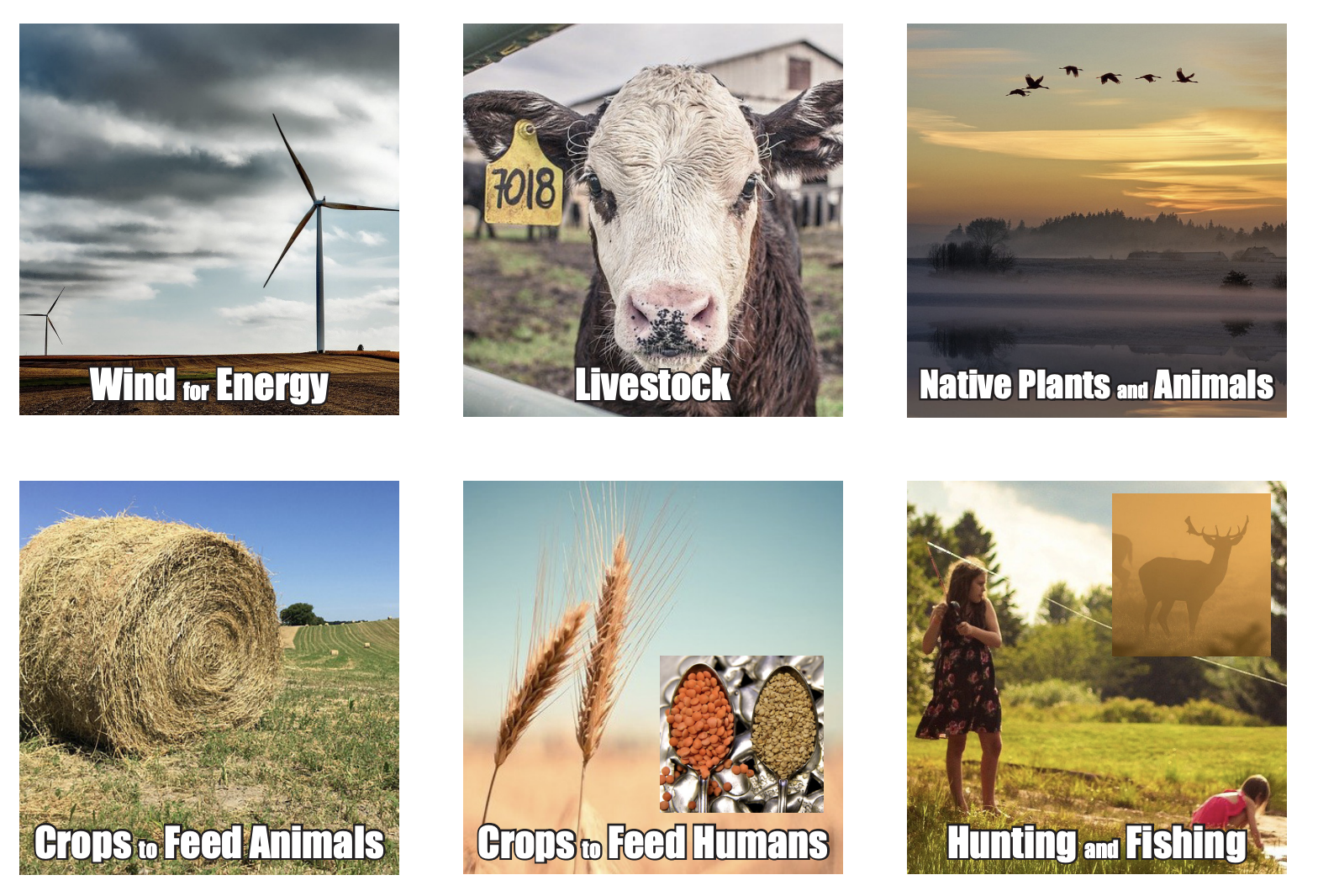What I Value About the Land Card Deck
A Land Use Explorers downloadable activity
Researchers on the WAFERx team study how different land use systems affect one another. If the way we use agricultural lands changes, then wildlife may be impacted. If we discover a new energy source, then human communities may be affected. Of course, every change and decision has a trade-off. Different people value different uses of the land.
This activity is based on the research of Dr. Meghann Jarchow at the University of South Dakota. She is working with students to understand what people value about the landscapes of the Upper Missouri River Basin and how those values are changing.
Use this activity to think about how YOU value the land; how you USE the land; what is most important to you; and what happens when the way we use the land changes. You can use this activity by yourself or with a partner. You could even try it with your family or some school friends!
- Download the What I Value About the Land Card Deck.
- Download the original What I Value About the Land activity (from the 2020 kit designed primarily for students working individually). This is the same as what it is on this page, just as a PDF.
Printing instructions:
- Download the card set [PDF] or make your own from paper or index cards (see instructions below)
- Print it out on card stock or heavier paper, if you have it (regular paper is OK, too)
- Print the pages back-to-back (two-sided) if you can. If your printer has a setting for “Flip on long edge” or “flip on short edge,” choose “flip on short edge.” If you can’t print double-sided, print them as two single pages and then use school glue or a glue stick to glue them together back-to-back into one page.
- Print out two sets of the cards (a total of two double-sided pages or four single-sided pages).
If you are unable to print the PDF, you can make your own deck.
- You will need 10 small pieces of paper or index cards for each deck.
- Write the following topics, one per card: Wind for Energy, Livestock, Native Plants and Animals, Crops for Energy, Crops to Feed Animals, Crops to Feed Humans, Hunting and Fishing, Homes and Communities, Fossil Fuels for Energy. One card will be blank – you will fill this in later.
- If you want to play with a partner, make a second deck exactly the same.
Playing instructions:
To get started, separate the cards into two decks and set one deck aside. Look at each card and make sure you understand what each picture represents. Ask an adult to help, if you need it. Now, pick up each card and think about how that use of the land affects you. You may have to think hard! For example, you may not be directly involved in fossil fuels for energy, but your family may own a car that runs on fossil fuels, so this use of the land affects you.
Next, think about how much you value having each of the activities on the landscape around you. Arrange all the cards from one deck in a row, with the land use you value most on the left and the one you value least on the right. If there is a land use you value that is not on one of the cards, write it on a blank card.
Now, take the second deck and arrange them in a row underneath, with the land use that is most common near you at the left, and the least common on the right. How do the rows compare? Are there land uses that you value but that are not common? Are there land uses that are common near you but that you do not value much?
Now, look at the first four cards in your bottom row—the land uses that are most common near you. How do you think these will change in the next 5 years? In 20 years?
Lastly, from the bottom row, move the last two cards on the far right to the left end of the row. If this change in land use happened, how do you think it would affect you, your family and your community? Would this change be more or less like your top row— the land uses you value most?
You can now try this game with a partner. Each person gets a deck and arranges it by what they value. How are your rows different or the same? What conclusions can you draw about your land use values?
If you come up with a new way to use your card deck or want to share a photo, please let us know! Email smrc@montana.edu

